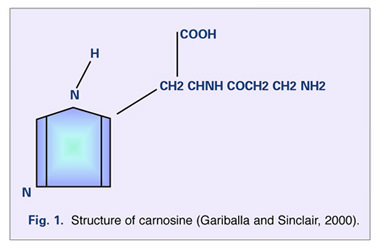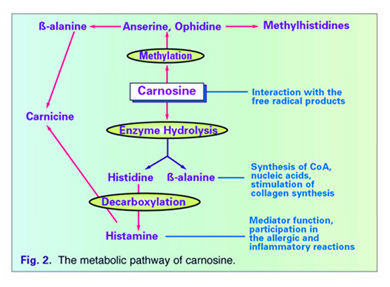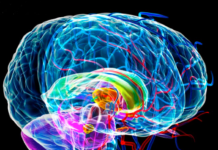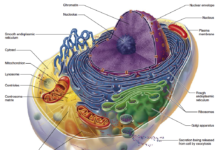Improving Language and Behavior in Children Diagnosed with Autistic Spectrum Disorder (ASD)
Jim English

L-Carnosine (Fig. 1) is a naturally occurring amino acid found in high concentrations in muscle, heart and brain tissues. L-Carnosine – not to be confused with the popular supplement, L-carnitine – is a highly effective anti-aging nutrient that possesses powerful antioxidant, free radical scavenging and neurotransmitter properties. Carnosine inhibits the formation of carbonyl groups, thereby reducing the formation of abnormal proteins. L-Carnosine extends maximum cell division capacity, protects against DNA oxidation, blocks glycosylation and reduces Advanced Glycation Endproducts (AGEs), as well as acting as a cell membrane stabilizer and an intracellular buffer (Fig. 2).

L-Carnosine is already a well-established anti-aging nutrient that is used to treat liver disease, cataracts, Alzheimer’s disease, and cancer. L-Carnosine has recently been shown to possess a tremendous potential for improving language and behavior in children diagnosed with Autistic Spectrum Disorders (ASD).
New Research
Researchers treated 31 autistic children, ranging from 3 to 12 years in age, with either 400 mg of L-Carnosine, twice a day, or a placebo, for 8 weeks. At the end of the study the children treated with L-Carnosine showed significant improvements in behavior, socialization, and communication, as well as increases in language comprehension based on CARS (Childhood Autism Rating Scale), vocabulary tests (E/ROWPVT) and biweekly parent reports. In the conclusion to their report the researchers state, “Oral supplementation with L-Carnosine resulted in demonstrable improvements in autistic behaviors, as well as increases in language comprehension that reached statistical significance.”
Benefits of L-Carnosine in Autism
In the Chez, et al study, the researchers report that L-Carnosine may improve receptive language, auditory processing, socialization, awareness of surroundings, and even help fine motor planning and expressive language when compared to placebo. Responses are usually seen between one to eight weeks after beginning treatment.
Dosage
Based on his clinical experience in treating autistic spectrum disorders, Dr. Chez recommends 400 mg of carnosine, twice daily, as an effective dose. Carnosine is available in 50 mg capsules (which allows for smaller doses and greater parental control when titrating to evaluate treatment effectiveness) and 500 mg capsules. L-Carnosine can be given with or without food, and since it is tasteless capsules may be opened to mix the white powder with foods and liquids. L-Carnosine is well tolerated by diabetics and can be used with ketogenic and gluten-casein free diets.
Long-Term Use
Anecdotal evidence suggests that some autistic children regress in some of their language gains when treatment with L-Carnosine was stopped. All children regained function when dosing was restarted.
Safety
Carnosine is considered an extremely non-toxic and safe substance. As with other antioxidants, carnosine acts synergistically when taken with other antioxidants. (For example, when vitamin E was taken with carnosine, levels of both substances were higher in cardiac muscle than when either was taken alone.)
Side Effects
Chez reports that manic or hyperactive autistic patients may show signs of over stimulation, including increased irritability, hyperactivity, or insomnia, when given higher doses of L-Carnosine. Symptoms usually respond by decreasing either the dose of L-Carnosine or other medications concurrently. No permanent negative physical changes have been noted in over 1,000 children treated with L-Carnosine since June of 2001. Furthermore, Chez reports no signs of adverse liver, blood, kidney, or central nervous system side effects.
|














[…] (L-carnosine) – A useful, safe, amino acid supplement that can help articulation, especially after speech […]
[…] followed up with some more online research. I found an article on Nutrition Review (found here) that talked about L-Carnosine and […]
[…] L-Carnosine L-Carnosine, is a naturally occurring amino acid found in high concentrations in muscle, heart and brain tissues. It has been used to treat liver disease, Alzheimer’s disease, and cancer. In the study below, children with autism who were given L-Carnosine showed significant improvements in behavior, socialization, and communication, as well as increases in language comprehension. Study: L-Carnosine and Autism: Improving Language and Behavior in Children Diagnosed with Autistic Spectrum… […]
I have been using this with my autistic 5 year old since October and the results have been huge. He mainly has issues with his behaviour and it has been life changing .
[…] Study: L-Carnosine and Autism: Improving Language and Behavior in Children Diagnosed with Autistic Spectrum… […]